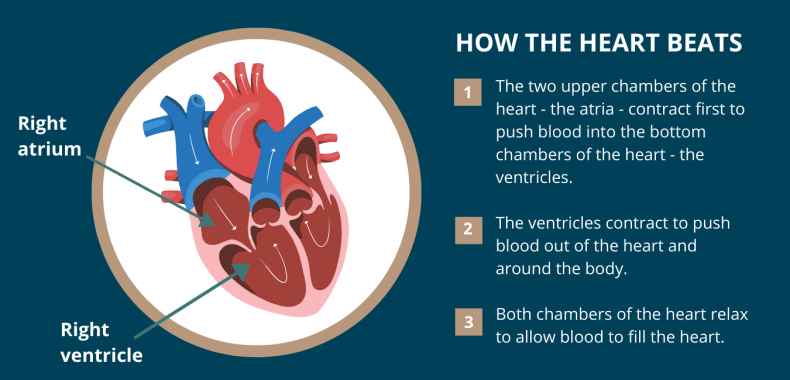Atrial fibrillation is a common heart rhythm problem, affecting over 800,000 people in England alone. With this condition the heartbeat is irregular and often faster than usual, which is called an arrhythmia. Atrial fibrillation can cause several symptoms ranging from palpitations, dizziness, fatigue and chest pain, but often there are no symptoms at all. Our guide to atrial fibrillation explains the risk factors, diagnosis and treatment for this heart condition.
What is atrial fibrillation?
Dr Shouvik Haldar, our consultant cardiologist and electrophysiologist at Royal Brompton Hospital, explains: “The heartbeat is controlled by electrical signals, which dictates the timing of your heartbeat.” In atrial fibrillation, the electrical signals become disorganised, causing the heart to quiver or contract in a fast, erratic way. While a normal resting heart rate ranges from between 60 and 100 beats per minute (bpm), people with atrial fibrillation may have a heartbeat as fast as 175 bpm.
“Atrial fibrillation is not often directly life threatening, however, if left untreated it can increase the risk of heart-related complications such as blood clots and heart failure”, adds Dr Haldar. Those with the condition are also five times more at risk of stroke, so early treatment is recommended.
What are atria?
The heart is composed of four chambers: two upper chambers (atria) and two lower chambers (ventricles). As the heart beats, it pumps blood from the atria into the ventricles. The ventricles then pump blood throughout the rest of the body.
In atrial fibrillation, the two atria chambers (which receive blood from the veins) contract irregularly and fail to relax properly between contractions. This can impact the heart’s performance.

How the heart beats
Atrial fibrillation symptoms
Atrial fibrillation symptoms can last minutes, hours and even weeks, and may come and go. Many people with the condition don’t have symptoms, however, signs and symptoms can include:
- heart palpitations (a fast, pounding heartbeat or a feeling that the heart is fluttering)
- shortness of breath
- light-headedness
- dizziness
- reduced tolerance to exercise
- fatigue
- chest pain
The precise cause of atrial fibrillation is not known, however, there are contributing factors which may increase the risk of developing the condition. These risk factors include:
- high blood pressure (hypertension)
- type 2 diabetes
- having pre-existing heart valve disease
- having pre-existing coronary artery disease
- obesity
- sleep apnoea (a condition which causes your breathing to stop and start while you sleep)
- excess alcohol consumption
- chronic obstructive pulmonary disease (COPD)
- having an overactive thyroid gland
Taking steps to reduce the above risk factors can therefore help with managing atrial fibrillation. These steps include stopping smoking, maintaining a healthy diet and regular exercise, to ensure your heart remains in the best possible condition.
A heart health check can help to identify risks or diagnose the presence of atrial fibrillation, to help you manage symptoms and provide treatment.
Diagnosing atrial fibrillation
Our cardiologists at our heart screening clinic will review your symptoms and perform tests to diagnose atrial fibrillation. Initially, they may listen to your heart using a stethoscope, which can allow them to detect an irregular heartbeat. Further diagnostic tests include:
- electrocardiogram (ECG): This painless test records the electrical activity of your heart through sensors attached to the skin on your chest, arms and legs
- echocardiogram: A type of ultrasound scan for your heart, which uses sound waves to produce an image of your heart
- chest X-ray: To help your doctor see the condition of your heart
- blood tests: These tests are useful for ruling out other problems (such as thyroid problems or diabetes), which can contribute to the onset of atrial fibrillation
Atrial fibrillation treatment
Our specialist cardiologists will provide treatment depending on your individual needs. Common treatments for atrial fibrillation include:
- medication: To control the heart rate and rhythm. As atrial fibrillation increases the risk of stroke, medication can also be used to thin the blood to therefore help reduce the risk of stroke
- cardioversion: A procedure that uses low energy, controlled electric shocks to help your heart return to a normal rhythm
- atrial fibrillation ablation: During this minimally invasive surgery, a thin electrode catheter (flexible tube) is directed into the heart to deliver heat, which destroys the malfunctioning heart muscle
- pacemaker: A pacemaker is a small electronic device which is placed into the chest to control abnormal heart rhythms
Find out more
If you’re experiencing symptoms or worried about your heart health, our specialist cardiologists are here to help. Learn more about our heart screening clinic or get in touch with our customer services team to book an appointment with our experienced team.

